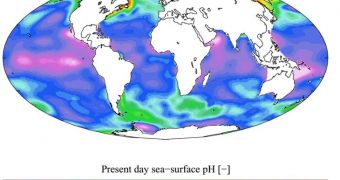With the advent of the Industrial Revolution, humans began putting more and more carbon dioxide into the atmosphere. The amount of the greenhouse gas has been increasing steadily since then, and is currently at very high levels, with billions of tons being emitted annually. In addition to the global warming effect this is causing, the higher atmospheric CO2 concentrations also modify the world's oceans, causing them to be more acidic. This phenomenon has been found to be causing a lot of damage to marine ecosystems, PhysOrg reports.
Lower levels of pH have been found to exist in the oceans for many years. Researchers have been continuously drawing attention to this fact, but politicians and lawmakers do not seem to have the will to do anything about it. The way CO2 acts on the water is fairly simple. As the dioxide interacts with water, it produces carbonic acid, whose concentrations then gradually increase. Since there is little phytoplankton to absorb the CO2, most of it turns into its acidic form, affecting fish populations, as well as the most important biodiversity hot spots in the water, coral reefs.
Speaking in Edinburgh this week, at the spring meeting of the Society for General Microbiology, Newcastle University postgraduate researcher Michael Maguire said that he and his colleagues were sadly able to identify acidification as the main cause of a drop in the prevalence of a critical group of bacteria in the water. The microorganisms, called Marine Roseobacter clade, play a crucial part in the biogeochemical cycle of the oceans, and they represent the first instance when a major bacterial group is being affected by acidification. Bacteria are renowned precisely for their ability to survive and adapt in almost any conditions.
The findings were made as the team conducted a simulation of how the ocean becomes more acidic, using data from current models of how atmospheric CO2 concentrations will evolve in the coming years. “This is the first time that a highly important bacterial group has been observed to decline in significant numbers with only a modest decrease in pH,” the expert said at the meeting. “Ocean acidification will not only have large scale consequences for marine ecosystems but also socio-economical consequences due to changes in fish stocks and erosion of coral reefs,” he concluded.

 14 DAY TRIAL //
14 DAY TRIAL //